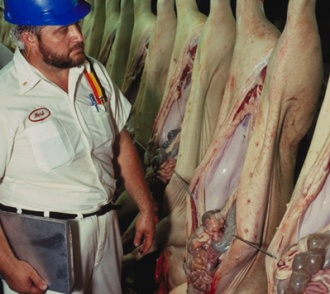This is the last article you can read this month
You can read more article this month
You can read more articles this month
Sorry your limit is up for this month
Reset on:
Please help support the Morning Star by subscribing here
Slaughterhouse Prayer (London Books) by John King is a really important novel, one that could and should change prevailing attitudes about how human beings treat animals.

Tense and all-consuming as it goes into dark places, it reminds us not only how badly and brutally we deal with our fellow creatures but also how we have the temerity to project our own worst vices on to innocent beings of other species.
Its main protagonist finds that peaceful campaigning has little effect on reducing the killing and abuse of animals and, instead, he moves towards direct action against those who are complicit in the everyday barbarities carried out in our name.
King’s narrative raises the moral issue of whether we can stand idly by when we know that terrible suffering is going on in our midst, yet it also acknowledges that that route is fraught with difficulties and dangers.
He's to be highly commended for tackling a topic in Slaughterhouse Prayer that most people — and most publishers — refuse even to contemplate tangentially, let alone look fully in the face. His book deserves to be a bestseller and, if it is, then maybe things will begin to change for the better.
Ever since I stumbled across John Hunt’s Ascent of Everest I’ve become a sucker for mountaineering books. Their hair-raising tales of falls, frostbite, fractured limbs and fatalities are especially enjoyable on a winter’s night when safely prone on the sofa.
Being more autobiographical than anything he’s previously written, Chris Bonington’s Ascent (Simon & Schuster) is relatively light on detail about his many mountain escapades. But he picks out the highlights of his main adventures very effectively and neatly summarises the key aspects of each without losing any of the drama.
Aside from some fine accounts of his outdoor pursuits he also opens up about his inner life — the selfishness and ego of the mountaineer, the ceaseless desire for the next challenge, coping with the death of colleagues and the challenges he has struggled with as a leader often accused of indecisiveness.
There are also moving passages about his complicated upbringing as the child of a communist-sympathising single mother and the strong but sometimes delicate relationship with his wife and family, stretched to breaking point by his wanderlust. Given that he’s in his eighties, this may well be Bonington’s final book. If it is, then it’s a fine way to bow out.
Still an angry man with a punk sensibility – identifying, he says, most easily with anarchism – Benjamin Zephaniah in The Life and Rhymes of Benjamin Zephaniah (Simon & Schuster) observes that “when I see what people have to put up with from their governments, I’m surprised they don’t rise up more often.”
There are hints throughout this autobiography of times when he has taken matters into his own hands, including during the Brixton riots of 1981, although he’s discreet enough to leave out the details.
Otherwise, many of the darker aspects of his life are tackled with down-to-earth honesty and insight, not to mention an element of gentle humour. That’s often needed as he chronicles his tough early years in Birmingham running, with his mum, from a physically abusive father, through to a more confident existence in the world of dub poetry.
With the emphasis on good storytelling, the political messages are rarely overpowering. And there’s also a happy ending in the shape of Zephaniah’s descriptions of the relaxed, rural existence he has come to enjoy in Lincolnshire as an older man.










